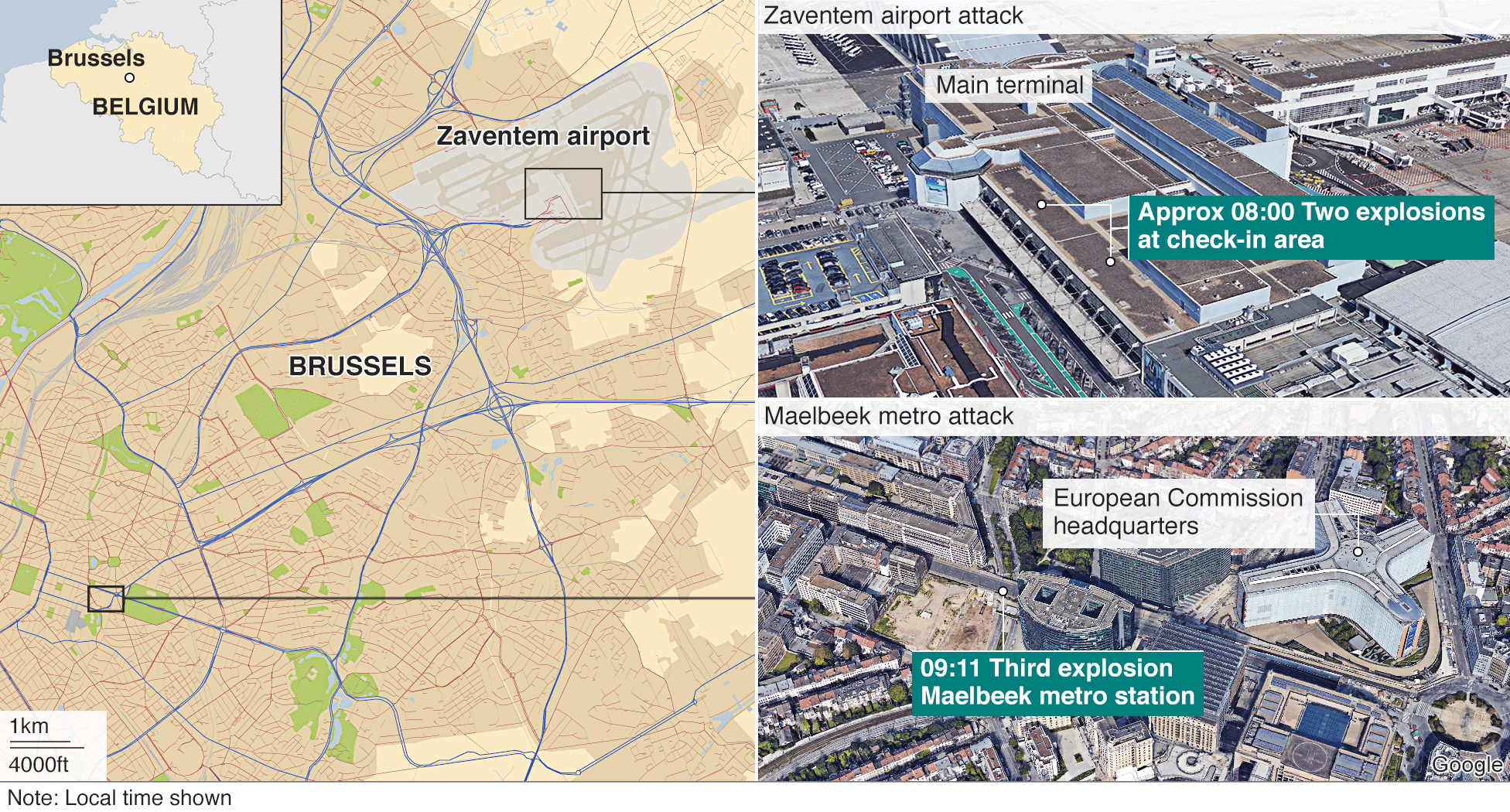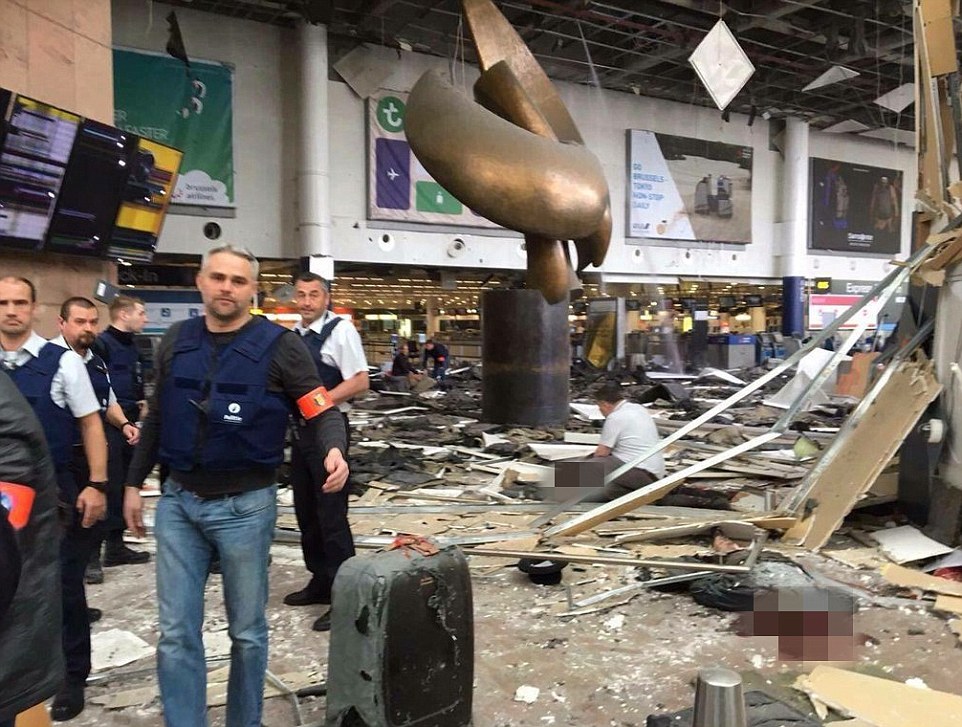
Brussels Attacked, IS claims responsibility
Three coordinated nail bombings rocked Belgium yesterday morning – two Brussels Airport, and one at Maalbeek metro station. As many as 32 civilians were killed and over 300 people were injured; three suicide bombers also died. Islamic State of Iraq and the Levant (ISIL) also known as Daesh has claimed responsibility for this deadliest attack of terrorism in Belgium’s history.
There were two explosions in the international departure hall at Brussels Airport at 07:58 local time: one near the British Airways and Iberia check-in desks, and the other between a Starbucks coffee shop and Brussels Airlines check-in desks. These explosions occurred 9 seconds apart and shattered windows, and significant damage occurred inside the building.
A third bomb was found in a search of the airport and was later destroyed by a controlled explosion. According to Belgium’s federal prosecutor, the suicide bombers had detonated nail bombs. An airport worker said he “heard someone yelling in Arabic before the blasts”.
The explosion on metro train took place just over an hour later at Maalbeek metro station about 10km from the airport. This place is near the European Commission headquarters in the centre of Brussels. The blast was caused in the middle carriage of the three -coach train.
These attacks have come when the European Union is still reeling from the November Paris attacks and scrambling to solve the migrant crisis. More important, they come as nationalist forces are challenging key principles of the Continental bloc, including the free movement of labour and the Schengen Agreement, which eliminated border controls among several member states.

Aftermath of the explosion ( Photo from Mail),
The atmosphere of fear and suspicion that is sure to follow will only worsen these social, political and economic crises.
The first outcome of the Brussels attacks will be a fresh round of debate over EU border controls, in particular those in the Schengen zone. The Schengen Agreement came under fire at the start of the migrant crisis in early 2015.
The Paris attacks escalated the controversy, particularly because the perpetrators moved between France and Belgium without detection. Consequently, France and other countries enhanced their border controls.
The European Commission has since said that it wants all border controls in the Schengen area lifted by the end of 2016. However, the latest attacks — and the potential that more will follow — will make this difficult.
Several governments in Western Europe will likely soon announce new national security legislation, improved controls on fighters returning from conflicts in West Asia, and North Africa, as well as enhanced intelligence sharing with their neighbours. EU members will also resume discussions on how best to combat terrorism abroad in troubled nations such as Libya and Syria.
Europeans will become more willing to contribute to the coalition against the Islamic State, possibly with more weapons and training for the Iraqi military and Kurdish militants, increased deployment of combat aircraft and participation in NATO surveillance missions in Turkey.
Another casualty could be the recent, tenuous agreement between Turkey and the European Union to limit the arrival of asylum seekers in Europe. Renewed awareness of the threat of terrorism among EU member states will bring focus on the bloc’s external borders, possibly justifying deeper cooperation with Turkey. But the attacks could also reignite anti-Muslim sentiments in Europe and increase popular demands on EU governments not to grant visa-free travel to Turkish citizens — a key stipulation from Ankara for cooperation on migrant issues.
As Stratfor points out, the anti-Muslim sentiment could also lead to more support for nationalist parties across the Continent. Both France and Germany will hold general elections next year. Naturally, the mainstream parties will find themselves under pressure. Whether they will borrow ideas from their electoral rivals for political survival remains to be seen. Isolationist tendencies can manifest in the Netherlands, Sweden and even the United Kingdom.
In the short run however the Brussels attacks will hurt European economies with less tourist inflows.
–YAMARAR
-
CHINA DIGEST
-
 ChinaChina Digest
China’s PMI falls for 3rd month highlighting challenges world’s second biggest economy faces
ChinaChina Digest
China’s PMI falls for 3rd month highlighting challenges world’s second biggest economy faces
-
 ChinaChina Digest
Xi urges Chinese envoys to create ‘diplomatic iron army’
ChinaChina Digest
Xi urges Chinese envoys to create ‘diplomatic iron army’
-
 ChinaChina Digest
What China’s new defense minister tells us about Xi’s military purge
ChinaChina Digest
What China’s new defense minister tells us about Xi’s military purge
-
 ChinaChina Digest
China removes nine PLA generals from top legislature in sign of wider purge
ChinaChina Digest
China removes nine PLA generals from top legislature in sign of wider purge
-
-
SOUTH ASIAN DIGEST
-
 South Asian Digest
Kataragama Kapuwa’s arrest sparks debate of divine offerings in Sri Lanka
South Asian Digest
Kataragama Kapuwa’s arrest sparks debate of divine offerings in Sri Lanka
-
 South Asian Digest
Nepal: Prime Minister Dahal reassures chief ministers on police adjustment, civil service law
South Asian Digest
Nepal: Prime Minister Dahal reassures chief ministers on police adjustment, civil service law
-
 South Asian Digest
Akhund’s visit to Islamabad may ease tensions on TTP issue
South Asian Digest
Akhund’s visit to Islamabad may ease tensions on TTP issue
-
 South Asian Digest
Pakistan: PTI top tier jolted by rejections ahead of polls
South Asian Digest
Pakistan: PTI top tier jolted by rejections ahead of polls
-






Comments